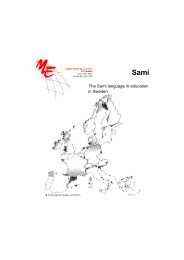Multilingual Early Language Transmission (MELT) - Mercator ...
Multilingual Early Language Transmission (MELT) - Mercator ...
Multilingual Early Language Transmission (MELT) - Mercator ...
Create successful ePaper yourself
Turn your PDF publications into a flip-book with our unique Google optimized e-Paper software.
acquisition. Some pre-school staff and parents have hardly any knowledge of multilingualism<br />
and have difficulties recognizing the advantages it presents. By providing information, the<br />
tutors hoped to change some negative attitudes of both practitioners and parents.<br />
Below some challenges faced by bilingual families are described.<br />
Some challenges faced by bilingual families:<br />
- Raising awareness of the benefits of multilingual child raising. (For example, by gathering<br />
information through flyers etc.).<br />
- Equal language input of both languages (50% minority/50% majority)<br />
- Consistency in ‘the one person – one language strategy.’ (For example, mother speaks the<br />
minority language; father the majority language to the child).<br />
- Enough information/materials to provide a language rich environment for the child. (For<br />
example, by telling stories en playing games).<br />
- Positive language approach regarding both languages and encouraging reactions towards<br />
children, when they speak the minority language (For example, giving compliments and<br />
confirmation to the child).<br />
- Positive language attitude regarding both languages, especially the minority language (For<br />
example, equal language status).<br />
Figure 5.1 Challenges faces by bilingual families.<br />
One of the leaders of a day care centre said after a successful information session by the<br />
tutor:<br />
“Parents and educators have learned much about the opportunities of a multilingual<br />
upbringing and what education may bring to children; they will surely share this information<br />
with others!”<br />
During the implementation process the tutors and the practitioners of the 40 participating<br />
pre-school institutions in the four regions experienced that immersion and language<br />
acquisition is most successful if pre-school teachers offered the children a rich and varied<br />
input in the minority language. In general, however, pre-school practitioners need<br />
confidence and guidance to develop the correct skills and expertise to create activities and<br />
an environment that promotes the child’s language development. This is certainly true in<br />
terms of inexperienced pre-school teachers, in addition to pre-school teachers who are<br />
speaking a language other than his/her own mother tongue to the child.<br />
Practitioners mentioned the need for concrete examples of language activities. They also<br />
wanted to know what kind of words, phrases and concepts they are expected to transmit to<br />
73



